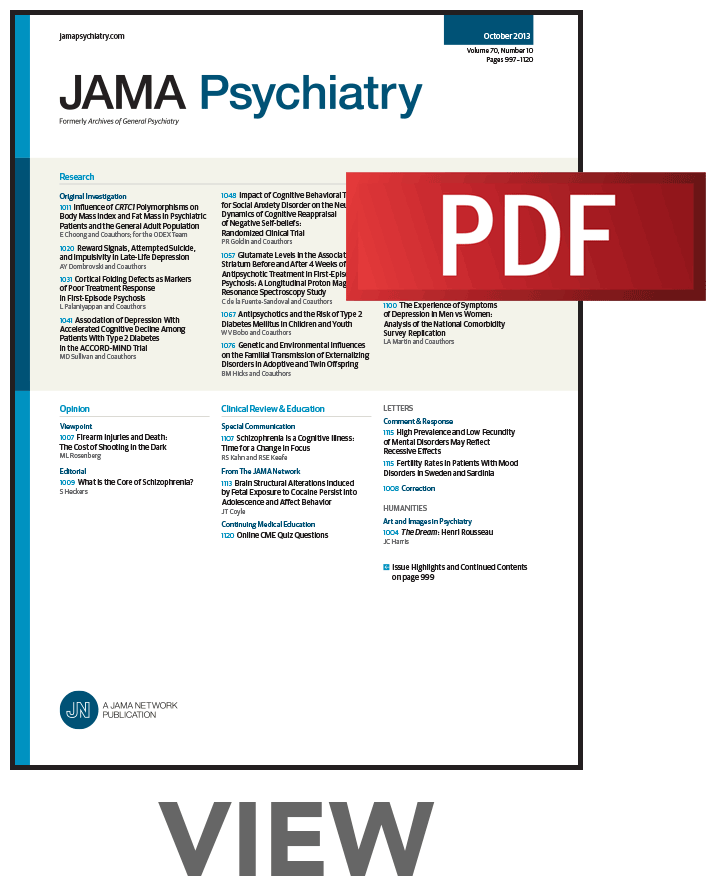Circulating Blood-Based Proteins in Psychopathology and Cognition
IF 22.5
1区 医学
Q1 PSYCHIATRY
引用次数: 0
Abstract
ImportancePeripheral (blood-based) biomarkers for psychiatric illness could benefit diagnosis and treatment, but research to date has typically been low throughput, and traditional case-control studies are subject to potential confounds of treatment and other exposures. Large-scale 2-sample mendelian randomization (MR) can examine the potentially causal impact of circulating proteins on neuropsychiatric phenotypes without these confounds.ObjectiveTo identify circulating proteins associated with risk for schizophrenia (SCZ), bipolar disorder (BD), and major depressive disorder (MDD) as well as cognitive task performance (CTP).Design, Setting, and ParticipantsIn a 2-sample MR design, significant proteomic quantitative trait loci were used as candidate instruments, obtained from 2 large-scale plasma proteomics datasets: the UK Biobank Pharma Proteomics Project (2923 proteins per 34 557 UK individuals) and deCODE Genetics (4719 proteins per 35 559 Icelandic individuals). Data analysis was performed from November 2023 to November 2024.ExposureGenetic influence on circulating levels of proteins in plasma.Main Outcomes and MeasuresOutcome measures were summary statistics drawn from recent large-scale genome-wide association studies for SCZ (67 323 cases and 93 456 controls), BD (40 463 cases and 313 436 controls), MDD (166 773 cases and 507 679 controls), and CTP (215 333 individuals). MR was carried out for each phenotype, and proteins that showed statistically significant (Bonferroni-corrected循环血液蛋白在精神病理和认知中的作用
精神疾病的外周(基于血液的)生物标志物有助于诊断和治疗,但迄今为止的研究通常是低通量的,传统的病例对照研究容易受到治疗和其他暴露的潜在混淆。大规模双样本孟德尔随机化(MR)可以检查循环蛋白对神经精神表型的潜在因果影响,而不存在这些混淆。目的确定与精神分裂症(SCZ)、双相情感障碍(BD)、重度抑郁症(MDD)以及认知任务表现(CTP)风险相关的循环蛋白。设计、设置和参与者在2个样本的MR设计中,使用显著的蛋白质组定量性状位点作为候选工具,这些位点来自2个大型血浆蛋白质组学数据集:UK Biobank Pharma proteomics Project(每34557名英国个体中有2923个蛋白质)和deCODE Genetics(每35559名冰岛个体中有4719个蛋白质)。数据分析时间为2023年11月至2024年11月。暴露基因对血浆中循环蛋白水平的影响。主要结果和测量结果是近期大规模全基因组关联研究的汇总统计数据,包括SCZ(67 323例和93 456例对照)、BD(40 463例和313 436例对照)、MDD(166 773例和507 679例对照)和CTP(215 333例对照)。对每种表型进行MR,显示有统计学意义的蛋白质(bonferroni校正P &;amp;lt;.05) MR分析的关联分别用于每种结果表型的通路、蛋白相互作用、药物靶点富集和潜在的药物可药性分析。结果smr分析揭示了113个bonferroni校正关联(46个新关联),涉及4种结局表型中的91个蛋白。免疫相关蛋白,如白细胞介素和补体因子,在多种结果表型中表现出多效性作用。药物靶标富集分析为抗炎药治疗SCZ、金刚烷胺治疗BD、视黄酸治疗MDD、度洛西汀治疗CTP提供了支持。结论和相关性识别循环蛋白对神经精神表型的潜在因果影响,提供了潜在的生物标志物,并为创新治疗策略的发展提供了见解。该研究还揭示了许多蛋白质在不同表型中的多效性作用,表明严重精神疾病和认知之间有共同的病因。
本文章由计算机程序翻译,如有差异,请以英文原文为准。
求助全文
约1分钟内获得全文
求助全文
来源期刊

JAMA Psychiatry
PSYCHIATRY-
CiteScore
30.60
自引率
1.90%
发文量
233
期刊介绍:
JAMA Psychiatry is a global, peer-reviewed journal catering to clinicians, scholars, and research scientists in psychiatry, mental health, behavioral science, and related fields. The Archives of Neurology & Psychiatry originated in 1919, splitting into two journals in 1959: Archives of Neurology and Archives of General Psychiatry. In 2013, these evolved into JAMA Neurology and JAMA Psychiatry, respectively. JAMA Psychiatry is affiliated with the JAMA Network, a group of peer-reviewed medical and specialty publications.
 求助内容:
求助内容: 应助结果提醒方式:
应助结果提醒方式:


